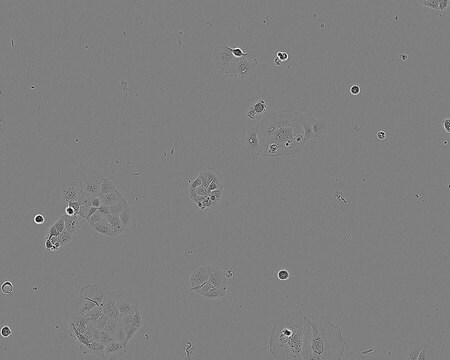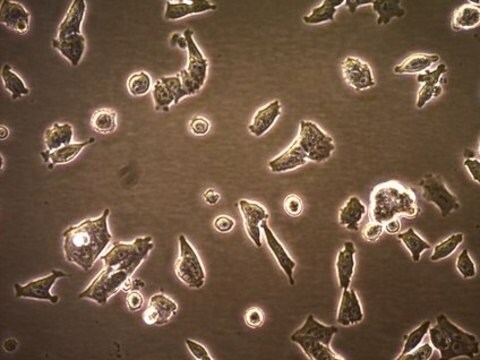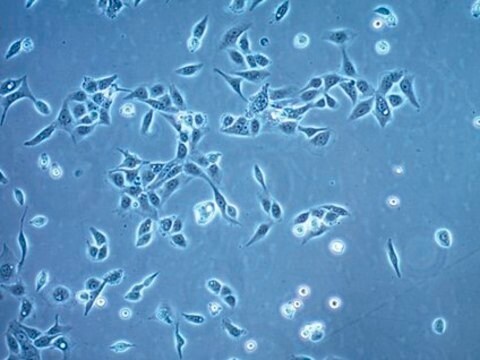VCaP Cell Line human
6020201, human prostate (metastasis), Epithelial
Synonim(y):
Human VCaP Cells, VCaP Cell Culture
Zaloguj sięWyświetlanie cen organizacyjnych i kontraktowych
About This Item
Kod UNSPSC:
41106514
Polecane produkty
product name
VCaP Cell Line human, 06020201, Prostate Cancer Metastasis
pochodzenie biologiczne
human prostate (metastasis)
tryb wzrostu
Adherent
kariotyp
Refer to reference (Korenchuk et al., 2001)
morfologia
Epithelial
produkty
Not specified
receptory
Androgen receptor
metody
cell culture | mammalian: suitable
powiązane choroby
metastasis
Warunki transportu
dry ice
temp. przechowywania
−196°C
Pochodzenie linii komórkowej
Human Prostate Cancer Metastasis
Opis linii komórkowej
This Vertebral-Cancer of the Prostate (VCaP) cell line was established from prostate cancer tissue harvested from a metastatic lesion to a lumbar vertebral body of a patient with hormone refractory prostate cancer. The cells are reported to express large quantities of prostate specific antigen (PSA). This cell line also expresses prostatic acid phosphatase (PAP), cytokeratin-18 and the androgen receptor, and is androgen sensitive in vitro and in vivo. This cell line offers a cell-based model system of human prostate cancer. The cells are tumourigenic in SCID mice.
Profil DNA
STR-PCR Data: Amelogenin: X,Y
CSF1PO: 10,12
D13S317: 11,12
D16S539: 9
D5S818: 12
D7S820: 9,12
THO1: 9.3
TPOX: 8,11
vWA: 18,19
CSF1PO: 10,12
D13S317: 11,12
D16S539: 9
D5S818: 12
D7S820: 9,12
THO1: 9.3
TPOX: 8,11
vWA: 18,19
pożywka hodowlana
DMEM:Ham′s F12 (1:1) + 2mM Glutamine + 10% Foetal Bovine Serum (FBS).
Rutyna subkultury
Split sub-confluent cultures (70-80%) 1:2 i.e. seeding at 2-5x10,000 cells/cm2 using 0.25% trypsin; 5% CO2; 37°C. Pellet cells by centrifugation and remove trypsin after inactivation of trypsin at each subculture.
Inne uwagi
Additional freight & handling charges may be applicable for Asia-Pacific shipments. Please check with your local Customer Service representative for more information.
Ta strona może zawierać tekst przetłumaczony maszynowo.
Certyfikaty analizy (CoA)
Poszukaj Certyfikaty analizy (CoA), wpisując numer partii/serii produktów. Numery serii i partii można znaleźć na etykiecie produktu po słowach „seria” lub „partia”.
Masz już ten produkt?
Dokumenty związane z niedawno zakupionymi produktami zostały zamieszczone w Bibliotece dokumentów.
Nasz zespół naukowców ma doświadczenie we wszystkich obszarach badań, w tym w naukach przyrodniczych, materiałoznawstwie, syntezie chemicznej, chromatografii, analityce i wielu innych dziedzinach.
Skontaktuj się z zespołem ds. pomocy technicznej



